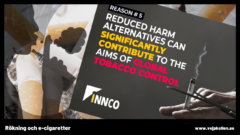"Electronic cigarettes are part of the solution for millions of smokers - not the problem!"
So says John Britton, Professor of Epidemiology at the University of Nottingham. He is one of several internationally active health scientists reacting with dismay to the WHO's campaign against e-cigarettes and other alternative nicotine products.
In a series of tweets and Facebook threads, the World Health Organisation (WHO) is now taking a tougher line on e-cigarettes and other alternative nicotine products. According to the WHO's latest report on tobacco in the world e-cigarettes are considered harmful. Those who sell the products using attractive flavours acting 'criminally" according to the WHO. Where e-cigarettes are not banned, the technology should be regulated even more strictly, says the WHO.
"Governments should protect the population from the harm of electronic cigarettes, especially children, young people and other vulnerable groups" says the WHO President Tedros Adhanom Ghebreyesus in a press release.
Massive criticism from researchers
The statement has prompted reactions from many leading health scientists, doctors and researchers around the world. Not least in United Kingdom, where e-cigarettes are an important part of a strategy to reduce the harm from smoking in the country. E-cigarettes are recommended for smoking cessation via different healthcare organisations and vejping with nicotine is today the most popular way to quit smoking in England.
Reduces smoke-related injuries
According to the UK Public Health Agency, e-cigarettes are significantly less harmful than cigarettes (5 per cent of the risks), while the technology attracts smokers who want to quit more than traditional methods. The popularity of e-cigarettes, combined with studies showing that the technology is twice as effective as nicotine replacement therapy, has justified more lenient legislation than in many other countries. The UK government expects that reduce smoking-related harm in the country dramatically already within 10 years.
"Smoking-related cancers and heart and lung diseases caused by smoking will disappear as cigarettes and burning tobacco are replaced by less harmful, smoke-free products." Says Peter Hajek, Head of the Tobacco Dependence Research Unit, Queen Mary University of London to Science Media Centre
Risking more smokers
According to Peter Hajek the WHO's stance on alternative niotine products, such as e-cigarettes, is therefore almost paradoxical from a public health perspective.
"Given the huge public health benefits that e-cigarettes and smokeless nicotine products can bring, it is remarkable that the WHO has taken such a strict stance against the development. We are now at risk of stalling the transition from smoking to smoke-free alternatives." says Peter Hajek.
"Should be labelled with a health warning"
At the same time, he points out that the WHO recommends countries to ban e-cigarettes while traditional smoking products are freely sold worldwide.
"The WHO is flatly proposing to ban the less harmful nicotine products. At the same time, they distort research findings that show their analysis is wrong. The report should be labelled with a big red health warning" says Peter Hajek.
Money from a private foundation
The WHO report is openly funded by Bloomberg Philanthropies, a private foundation founded by politician and billionaire Michael Bloomberg. Michael Blomberg is known for his ambition to reduce smoking worldwide, but also for his outspoken opposition to harm reduction, e-cigarettes and, above all, flavours. The foundation has come under fire for directly or indirectly trying to Steer health policy in several low- and middle-income countries. Investigations has shown that the Foundation awards millions in grants for research and policy work, provided that it leads to stricter regulations or preferably bans on alternative nicotine products such as e-cigarettes.
Only favours cigarette sales
In the US, Bloomberg funds anti-tobacco groups like Tobacco free kids, an organisation that is ideologically close to Swedish Non smoking generation. Internationally, the Foundation operates through The Unionan organisation that has been pushing for a ban on e-cigarettes and flavours in countries like India, Mexico and The Phillipines. The Union has been instrumental in severely restricting access to harm reduction products in several low- and middle-income countries. In countries where smoking rates are already very high, bans only favour cigarette sales according to critics. This is particularly true in countries where the state owns all or part of tobacco companies (e.g. China, India and Thailand), while the availability of effective smoking cessation is poor.
"Unethical and anti-scientific message"
Bloomberg's involvement in WHO policy work is deeply problematic, says Clive Bates, founder of anti-smoking organisation ASH in the UK and now policy consultant on sustainability issues.
"The Bloomerg Foundation does more harm than good with its money. In this case, the foundation has more or less 'hired' the WHO and is using the organisation as a megaphone for a very unethical and anti-scientific message." Says Clive Bates to Filter magazine.
Compare with vaccine opponents
He is joined by Charles Gardner, Secretary General of INNCO, an international harm reduction association founded by consumer organisations from 35 countries.
"Would we accept a policy on vaccination paid for by an anti-vaccinationist? Or a UN climate policy funded by a climate denier? No, we wouldn't. So why is it okay that the WHO's policy on harm reduction products is funded by a rich activist who denies harm reduction and wants to ban alternatives to cigarettes? he tells Filter magazine.
Ignoring millions of ex-smokers
The WHO has also has been heavily criticised in the past for its policy towards tobacco harm reduction. Despite 20 years of efforts smoking is increasing in countries where cigarettes are the only way to utilise nicotine. In countries like Sweden, England and USA smoking, on the other hand, decreases as e-cigarettes and snus gain ground.
"The WHO continues to take a short-sighted and unscientific approach to the problem of smoking. It chooses to ignore millions of people, all those who have failed to quit smoking by means other than e-cigarettes" says Cliff Douglas, Director at University of Michigan Tobacco Research Network and former President of the American Cancer Society.
"Potential to reduce mortality worldwide"
According to Cliff Douglas the growing concern among 1TP8 smokers should be taken very seriously. He says the World Health Organisation should reassess its approach to harm reduction for smokers, before it is too late.
"It is extremely worrying that the WHO chooses to increase its efforts to destroy the variant of harm reduction whose potential to reduce mortality and morbidity on a global scale is unprecedented" says Cliff Douglas to filters.




